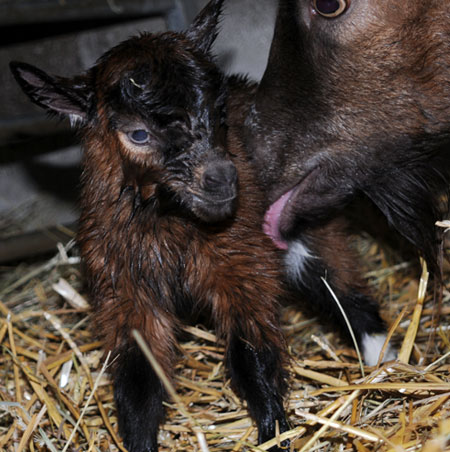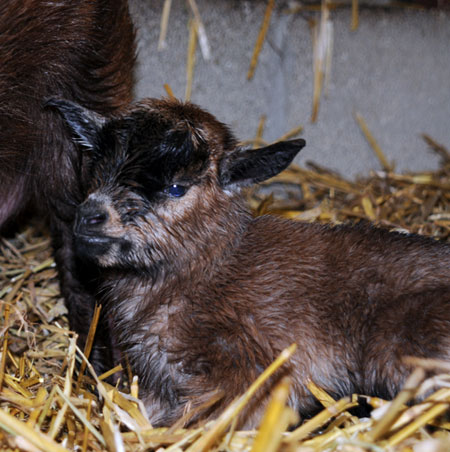Welcome to Relaxed Farming
- Alpacas
- Chickens
- Dairy Goats
- Ducks
- Geese
- Pigs
- Pygmy Goats
- Quail
- Rabbits
- Sheep
- Turkeys
- Polytunnel
- Photo Stories
- Video Stories
- Food
- Smallholding Map
- 2013
- 2014


- August
- September
- October
- November
- December
- January
- February
- March
- April
- May
- June
- July
- August


- 1
- 2
- 3
- 4
- 5
- 6
- 7
- 8
- 9
- 10
- 11
- 12
- 13
- 14
- 15
- 16
- 17
- 18
- 19
- 20
- 21
- 22
- 23
- 24
- 25
- 26
- 27
- 28
- 29
- 30
- 31
Monday, 23rd February 2015
Mushroom now has two playmates: these two are Currant and Sultana, they were born to Sage between 3.30pm and 4pm today AND they are both girls. Their birth was perfect: out popped Sultana, twenty minutes later out popped Currant and within half an hour they had both taken their first drink of milk (colostrum) without any help from us at all.
Sage is a very attentive mum, she licked and licked both the kids dry and all the time constantly talked to them with a very low bleating sound. This bleat will be individual to Sage and her kids will get to know it well and hopefully respond to it. They have pretty good voices themselves and when Sage turned her back at one point to nibble on a bit of straw, Currant screamed VERY loudly to show her annoyance.
Sage passed her afterbirth a couple of hours after giving birth. The afterbirth is what remains after the kids have been born: the tissues and membranes that were part of what surrounded the kids when they were inside their mum. A lot of animals eat their afterbirth: there are thought to be two main reasons they do this. The first is because the afterbirth is full of protein, vitamins and minerals and so is actually very good for the mum to ingest. Secondly, in the wild the afterbirth is likely to attract predators and so a 'natural' behaviour is to eat it in order to remove any evidence of the birth. Even though pygmy goats are now domesticated, this behaviour is probably still very much built in.
Two out of our six pygmy goats have now kidded, we have three healthy female kids and both mums are doing a fab job of looking after their youngsters! A great start!!
Read more about these two in the Kidding 2015 section.

